Rio’s Olympics 1 year later: The good, the bad and the ugly

FILE – In this Aug. 20, 2016 file photo, Brazil’s Neymar kisses the ball before scoring the decisive penalty kick during the final match of the mens’s Olympic football tournament at the Maracana stadium in Rio de Janeiro, Brazil. As Rio de Janeiro reels from corruption, rising crime and unfinished infrastructure, its residents can look no further than the iconic image of Neymar to remind them of the Rio de Janeiro Olympics that took place one year ago and the price they payed for hosting the games. (AP Photo/Leo Correa, File)
RIO DE JANEIRO — Neymar kissed the ball, delivered a gold medal and then wept with other Brazilians.
Look no further if you’re searching for an iconic image of the Rio de Janeiro Olympics.
“It’s the only medal that really mattered,” Salvador Gaeta said recently while cycling in the deserted Olympic Park. “Every Brazilian will remember it.”
Other memories have faded at home since the Olympics opened a year ago. A few expectations were met, but many fell short of those promised by IOC President Thomas Bach and organizing committee head Carlos Nuzman.
Bach boasted at the closing ceremony of “a Rio de Janeiro before, and a much better Rio de Janeiro after the Olympic Games.”
Nuzman called Rio the next Barcelona, one of the cities clearly transformed by the games.
Save for minor cosmetic changes, a city fractured by mountains and searing inequality remains as it was. Violent crime mostly concealed during the Olympics is soaring, tied to Brazil’s deepest economic downturn in 100 years and unpaid policemen leaving in droves. Brazil’s military has been called in to quell Rio’s untethered violence.
Rio barely managed to keep it together for the Olympics, needed a government bailout to hold the Paralympics and then collapsed under a grinding recession and sprawling corruption scandals.
The games took place mostly in the south and west of the city, which remains white and wealthy. The rest is still a hodgepodge of dilapidated factories and hillside slums of cinderblocks, tin roofs and open troughs of raw sewage.
Brazil says it spent $13 billion in public and private money to organize the Olympics — some estimates suggest $20 billion — and many games-related projects since then have been tied to corruption scandals that marred the games and drove up costs. Federal police and prosecutors have linked overpriced projects to graft between politicians and construction companies.
A look at the fallout since the Olympics opened on Aug. 5:
THE GOOD
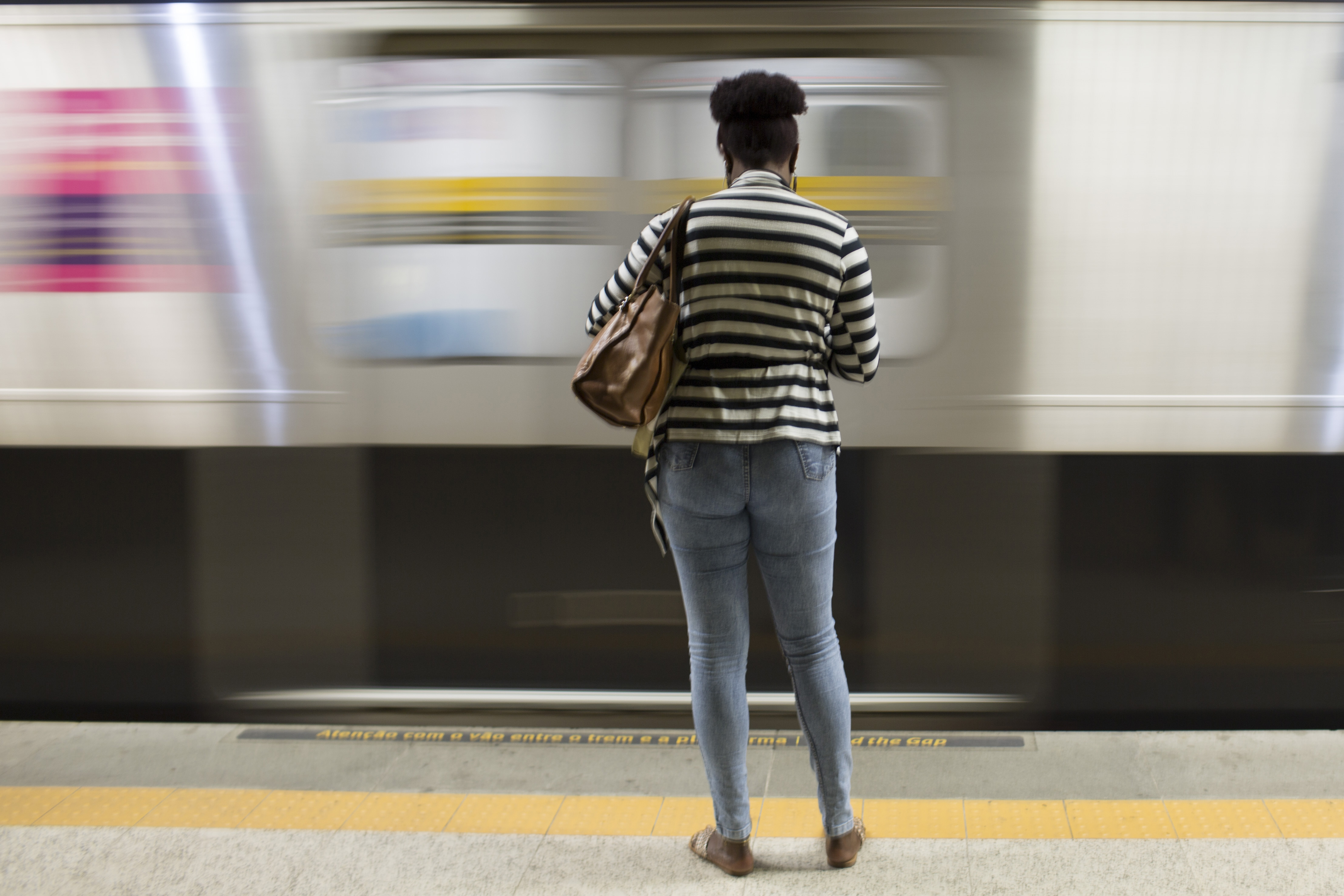
In this July 17, 2017 photo, a commuter waits for the next car at the Jardim Oceanico subway station, in Rio de Janeiro, Brazil. The Olympics left behind a new subway line extension, high-speed bus service, and an urban jewel: a renovated port area filled with food stands, musicians, and safe street life in city rife with crime. These probably would not have been built without the prestige of the Olympics. But the games also imposed deadlines and drove up the price. A state auditor’s report said the 9.7 billion real ($3 billion) subway was overbilled by 25 percent. (AP Photo/Renata Brito)
The Olympics left behind a new subway line extension, high-speed bus service and an urban jewel: a renovated port area filled with food stands, musicians and safe street life in a city rife with crime.
These probably would not have been built without the prestige of the Olympics. But the games also imposed deadlines and drove up the price. A state auditor’s report said the 9.7 billion real ($3 billion) subway was overbilled by 25 percent.
Igor Silverio lives nearby the port in a favela — or shanytown — and came the other day to kick around a soccer ball with his two young boys. The area in his youth was known for decay and drunkenness.

In this July 16, 2017 photo, Igor Silverio poses for a photo at Praca Maua in the renovated port area, in Rio de Janeiro, Brazil. Before the Olympic Games the area was known for decay and drunkenness. Igor Silverio lives nearby the port in a favela, or shanytown, and came the other day to kick around a soccer ball with his two young boys. “For sure it’s better,” he said. But he added he “expected more from the Olympics.” (AP Photo/Renata Brito)
“For sure it’s better,” he said. But, he added, he “expected more from the Olympics.”
“From my point of view, the Olympics only benefited the foreigners. Local people themselves didn’t get much. The security situation isn’t good, the hospitals. I think these are investments that didn’t benefit many local people.”
He said he skipped the Olympics because they were “too expensive” and located far away in the suburbs.
Standing outside the new subway line, 57-year-old domestic worker Isa Trajano Fernandes said public transportation had improved but was still deficient.
“When the Olympics were going on it was better, but then they let it slide,” she said.
She complained about crowding on the new express buses and the lack of security.
“People have no dignity using public transportation in Rio de Janeiro,” she said.
THE BAD
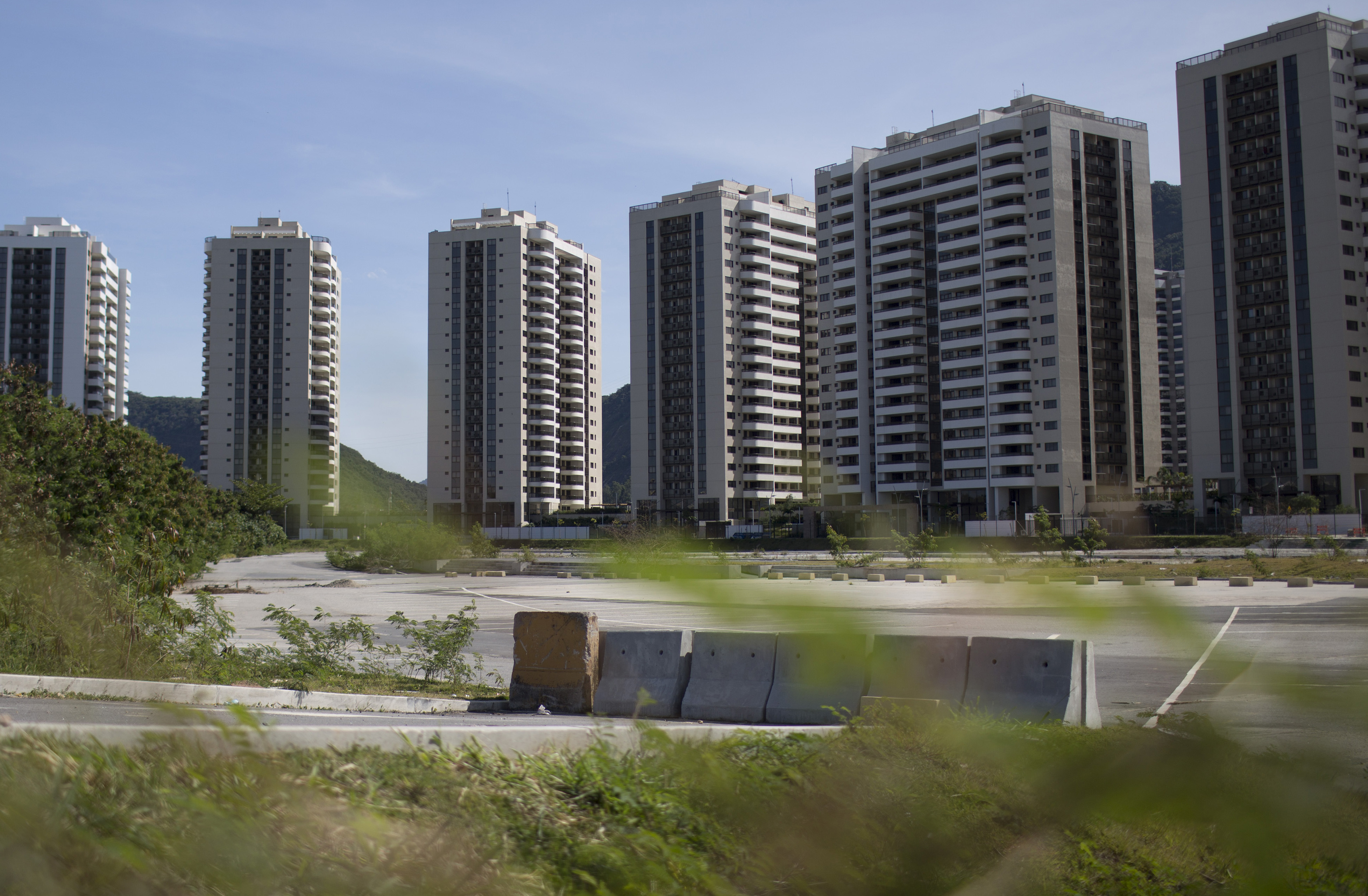
In this July 16, 2017 photo, an empty parking lot is seen in front of the Athlete’s Village, in Rio de Janeiro, Brazil. More than 3,600 apartments remain unoccupied. (AP Photo/Renata Brito)
The Olympics left a half-dozen vacant sports arenas in the Olympic Park and 3,600 empty apartments in the boarded-up Olympic Village. Deodoro, a major complex of venues in the impoverished north, is shuttered behind iron gates.
Standing across the street, Jose Mauricio Pehna de Souza was asked if Rio benefited from the Olympics.
“I don’t think so, not us in Brazil,” he said.
A $20 million golf course is struggling to find players and financing.
A few dozen were on the course on a recent, sunny Saturday. The clubhouse is mostly unfurnished, and it costs non-Brazilians 560 reals ($180) for 18 holes and a cart.
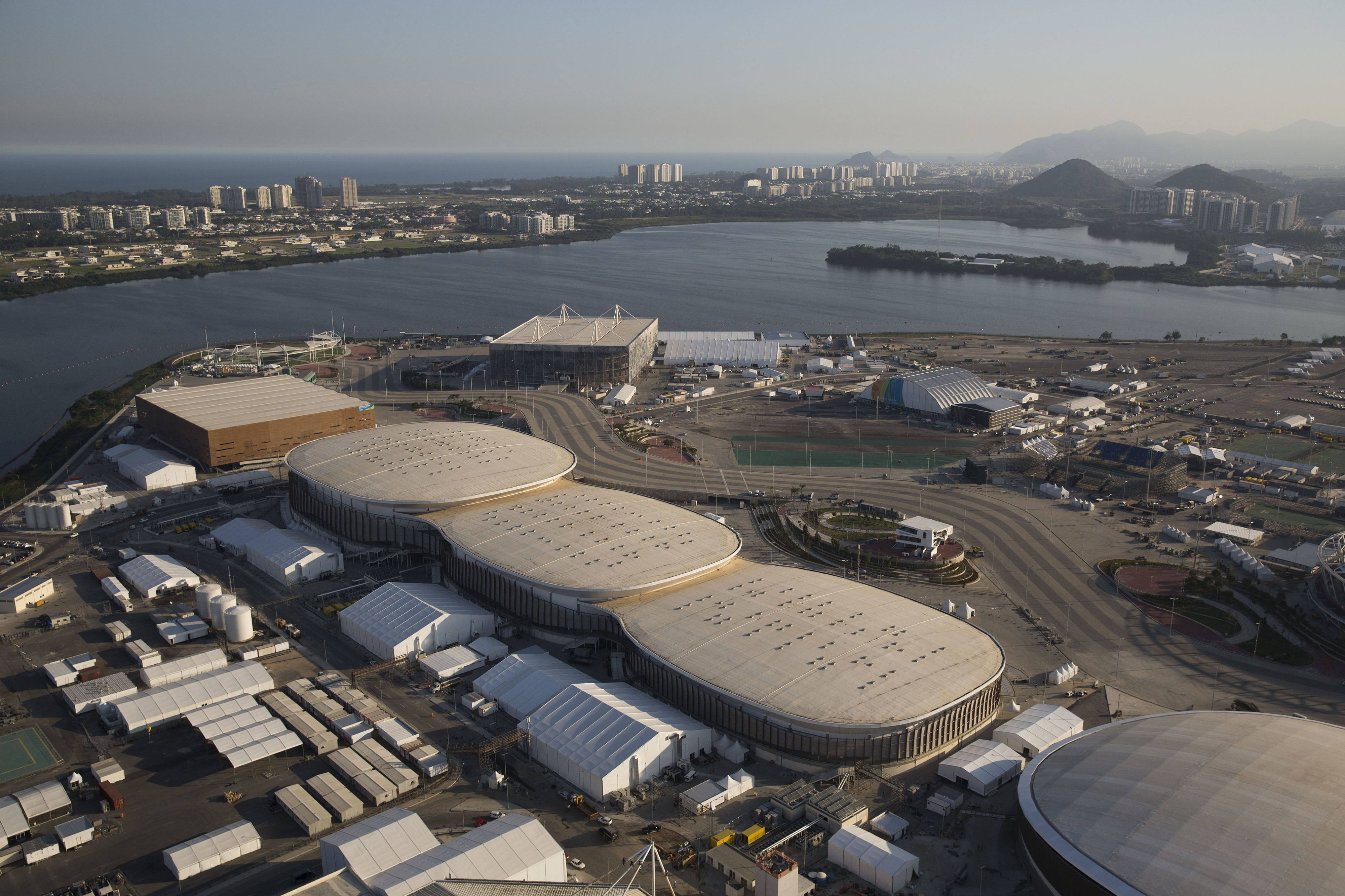
File – In this July 4, 2016 file photo, the Olympic Park of the 2016 Olympics is seen from the air, in Rio de Janeiro, Brazil. The Olympics left half-dozen vacant sports arenas in the Olympic Park, and 3,600 empty apartments in the vast, boarded-up Olympic Village. (AP Photo/Felipe Dana, File)
Organizers and the International Olympic Committee say Rio needs time to develop these venues, and faults Brazil’s deep recession for most of the problems.
A prosecutor several months ago disputed this, saying the Olympic Park “lacked planning how to use white elephant” sports venues. Many were built as part of real estate deals that have yet to pan out.
Juliana Solaira, a 30-year-old pharmacist who lives across from the park, called the space “an excellent legacy” but said “few people use it.”
“Here we see all this money spent,” she said. “Unfortunately, we see most of the arenas are closed. So I think it could have been used in a better way.”
The park offers few amenities: no restaurants, no shade and nothing much to do except gawk at deserted arenas. City hall officials and the federal government say they’re planning an event for Aug. 5 to “fill all the arenas” for the day.
THE UGLY
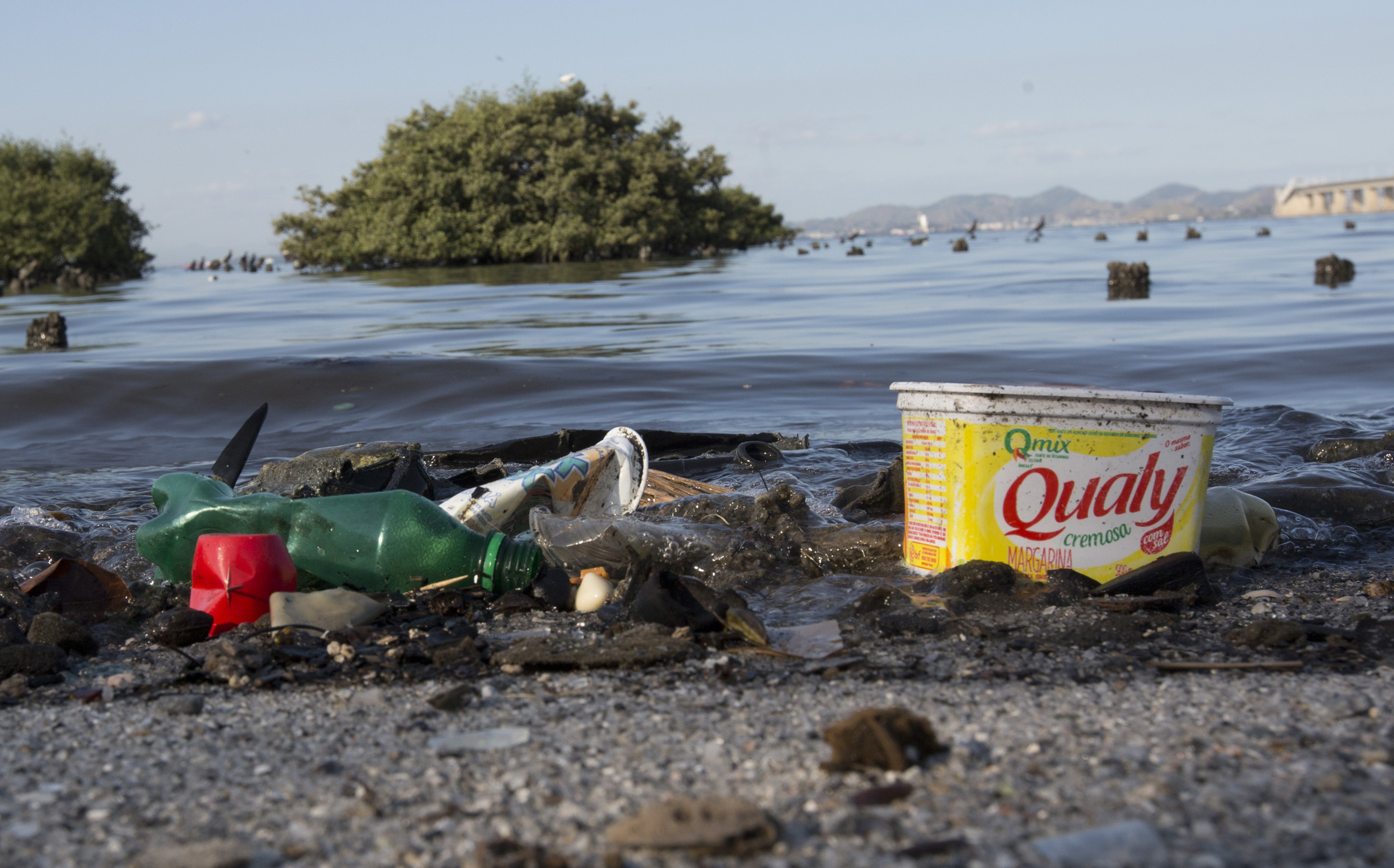
In this July 27, 2017 photo, trash lays on the coast of Guanabara bay, in Rio de Janeiro, Brazil. Rio organizers promised to clean up polluted Guanabara Bay in their winning bid in 2009. During the Olympics, officials used stop-gap measures to keep floating sofas, logs, and dead animals from crashing into boats during the sailing events. Since the Olympics, the bankrupt state of Rio de Janeiro has ceased major efforts to clean the bay, with the unwelcome stench usually drifting along the highway from the international airport. (AP Photo/Silvia Izquierdo)
Rio organizers promised to clean up polluted Guanabara Bay in their winning bid in 2009. During the Olympics, officials used stop-gap measures to keep floating sofas, logs and dead animals from crashing into boats during the sailing events.
Since the Olympics, the bankrupt state of Rio de Janeiro has ceased major efforts to clean the bay, its unwelcome stench often drifting along the highway from the international airport.
“I think it’s gotten worse,” Brazil’s gold-medal sailor Kahena Kunze said in a recent interview. “There was always floating trash, but I see more and more. It’s no use hiding the trash because it comes back. I figured it would get worse because I haven’t seen anything concrete being done.”
Avenida Brasil, the main north-south artery through the city, is a snarl of unfinished roads and express bus lanes, viaducts to nowhere and detours through miles (kilometers) of traffic cones.
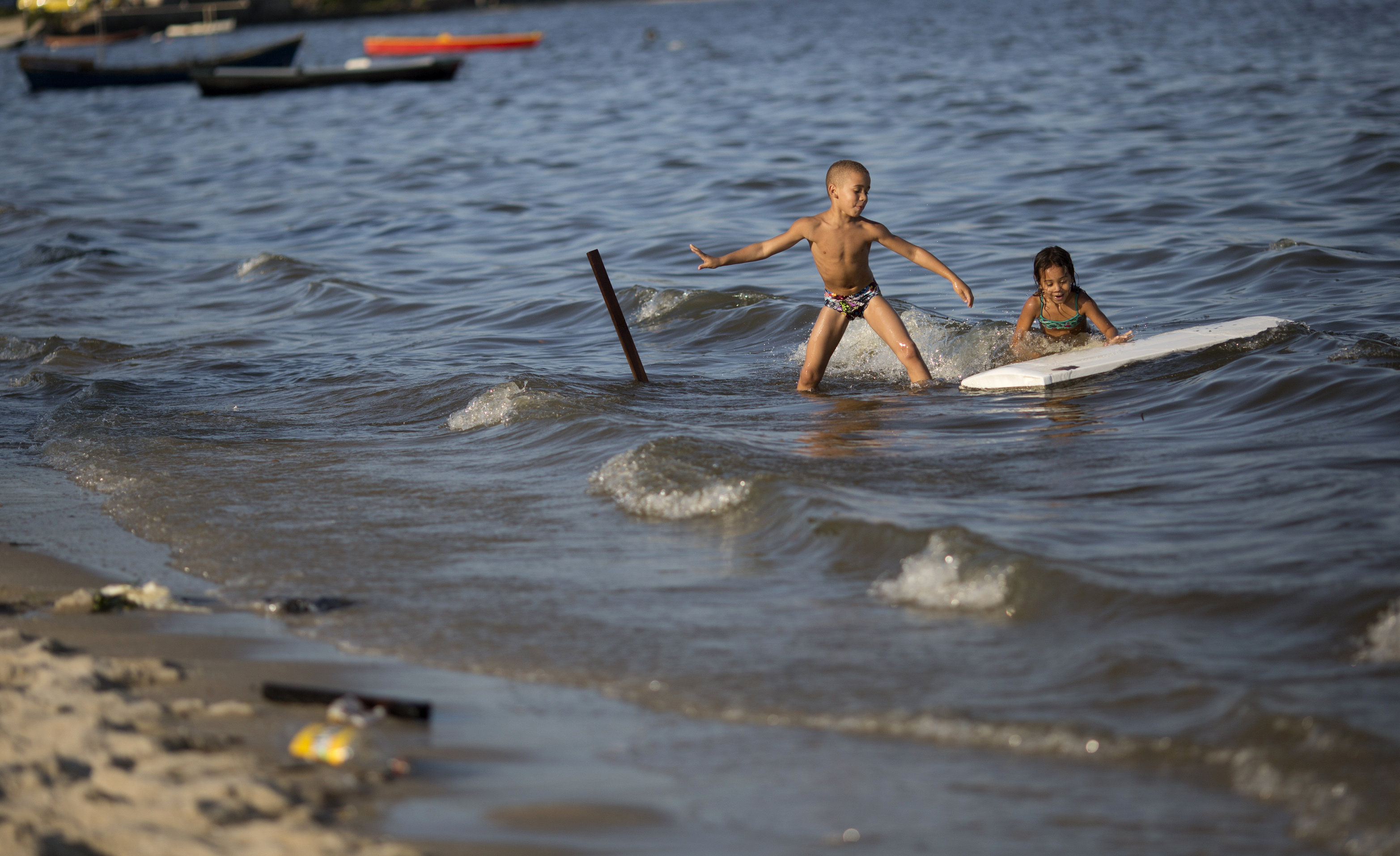
In this July 27, 2017 photo, children play with a foam board in the polluted Guanabara bay, in Rio de Janeiro, Brazil. Rio organizers promised to clean up polluted Guanabara Bay in their winning bid in 2009. During the Olympics, officials used stop-gap measures to keep floating sofas, logs, and dead animals from crashing into boats during the sailing events. Since the Olympics, the bankrupt state of Rio de Janeiro has ceased major efforts to clean the bay, with the unwelcome stench usually drifting along the highway from the international airport. (AP Photo/Silvia Izquierdo)
Some of the politicians behind the Olympics have been accused of graft, and organizers still owe creditors about $30 million to 40 million.
Former President Luiz Inacio Lula da Silva, who wept when Rio was awarded the games, was convicted last month on corruption charges and faces a 9 1/2-year prison term. He is appealing.
Former Rio de Janeiro Mayor Eduardo Paes , the local moving force behind the Olympics, is being investigated for allegedly accepting at least 15 million reals ($5 million) in payments to facilitate construction projects tied to the games. He denies wrongdoing.
Another early booster, former Rio state governor Sergio Cabral, is in jail on corruption charges.
Carlos Nuzman, president of the organizing committee, was defeated earlier this year in an election to lead the Pan American Sports Organization. He ran on his record leading the Rio Olympics and finished third in a three-man race.